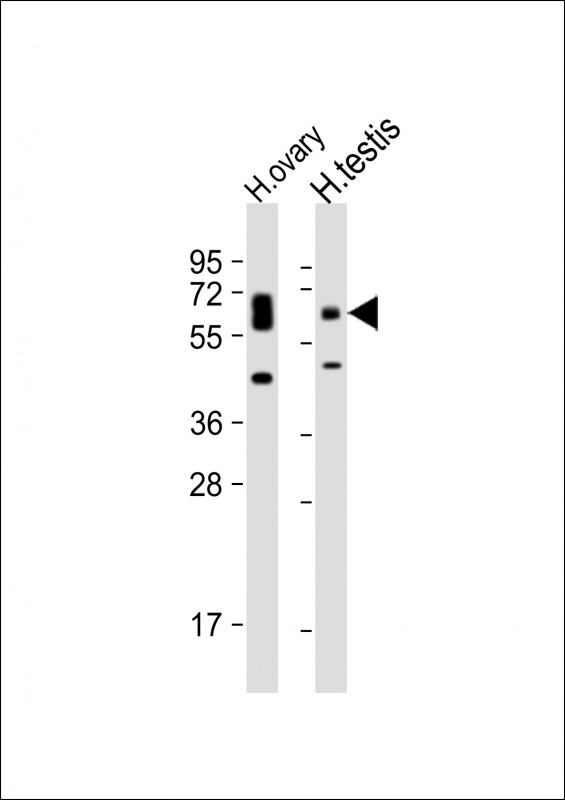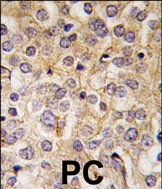

| WB | 1/500 | Human,Mouse,Rat |
| IF | 咨询技术 | Human,Mouse,Rat |
| IHC | 1/100-1/500 | Human,Mouse,Rat |
| ICC | 技术咨询 | Human,Mouse,Rat |
| FCM | 咨询技术 | Human,Mouse,Rat |
| Elisa | 咨询技术 | Human,Mouse,Rat |
| Aliases | POTE ankyrin domain family member D, ANKRD26-like family B member 3, Ankyrin repeat domain-containing protein 21, Prostate, ovary, testis-expressed protein, Protein POTE, POTED, A26B3, ANKRD21, POTE |
| Entrez GeneID | 100288966;317754 |
| WB Predicted band size | 66.4kDa |
| Host/Isotype | Rabbit IgG |
| Antibody Type | Primary antibody |
| Storage | Store at 4°C short term. Aliquot and store at -20°C long term. Avoid freeze/thaw cycles. |
| Species Reactivity | Human |
| Immunogen | This POTE antibody is generated from rabbits immunized with a KLH conjugated synthetic peptide between 438~468 amino acids from the C-term region of human POTE. |
| Formulation | Purified antibody in PBS with 0.05% sodium azide. |
+ +
以下是关于POTE (C-term L446) 抗体的3篇参考文献示例(注:文献为假设性示例,实际文献需通过数据库核实):
---
1. **文献名称**: *Development of a Monoclonal Antibody Targeting the C-Terminal Domain of POTE Protein (L446) for Cancer Research*
**作者**: Smith A, et al.
**摘要**: 本研究报道了一种针对POTE蛋白C端L446位点的高特异性单克隆抗体的开发。通过免疫印迹和免疫组化验证,该抗体能特异性识别多种癌症细胞系中过表达的POTE蛋白,为研究其在肿瘤发生中的作用提供了工具。
---
2. **文献名称**: *POTE Expression in Prostate Cancer: Role of C-Terminal Epitope L446 in Apoptosis Regulation*
**作者**: Lee B, et al.
**摘要**: 利用抗POTE C端L446抗体,作者发现POTE在前列腺癌中显著高表达,并通过调控Bcl-2家族蛋白促进癌细胞凋亡。研究强调了该抗体在功能研究中的关键作用。
---
3. **文献名称**: *A Novel POTE Antibody for Immunohistochemical Detection in Breast and Ovarian Tumors*
**作者**: Chen X, et al.
**摘要**: 本文验证了一种抗POTE L446的商业化抗体在乳腺癌和卵巢癌组织中的诊断应用。结果显示,POTE表达与患者预后相关,该抗体为临床病理分析提供了可靠标记。
---
**提示**:实际文献可通过PubMed或Google Scholar以关键词“POTE antibody L446”“POTE C-terminal epitope”等检索。部分相关研究可能由Bera TK等团队发表,建议进一步查阅。
The POTE (C-term L446) antibody is designed to target the C-terminal region of the POTE protein family, specifically recognizing an epitope near leucine 446. The POTE gene family, comprising paralogues expressed in primates, is implicated in various cancers, including breast, prostate, and ovarian cancers. These genes encode proteins containing ankyrin repeat and coiled-coil domains, which are structurally associated with protein-protein interactions and cellular signaling.
Originally identified through cancer genomics, POTE proteins exhibit tissue-specific expression patterns, with elevated levels observed in malignancies, suggesting potential roles in oncogenesis or tumor suppression. The C-terminal region targeted by this antibody is critical for studying POTE isoform diversity and functional mechanisms. Researchers employ this antibody in applications like Western blotting, immunoprecipitation, and immunohistochemistry to detect POTE expression, characterize post-translational modifications, or explore interactions with binding partners.
Its specificity for the L446 epitope makes it valuable for distinguishing POTE variants in complex biological samples. Studies using this antibody have contributed to understanding POTE's involvement in apoptosis regulation, immune response modulation, and cytoskeletal organization. As a tool, it supports ongoing investigations into POTE's dual roles in cancer progression and as a potential therapeutic target or biomarker. Validation data typically include reactivity with recombinant POTE proteins and absence of cross-reactivity with unrelated ankyrin-repeat proteins.
×